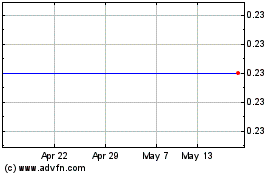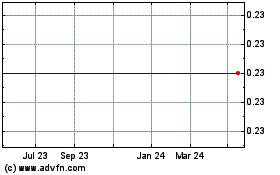Management Consulting Group PLC Final Results -2-
March 05 2015 - 2:02AM
UK Regulatory
Underlying operating profit in 2014 was GBP11.8m (2013:
GBP21.2m), the GBP9.4m reduction principally reflecting the impact
of lower revenues and margins in Alexander Proudfoot, resulting in
a loss for the year as a whole in that business of GBP1.6m.
Underlying operating profit in Kurt Salmon was slightly lower than
the previous year in absolute terms at GBP13.4m, although the
margin improved slightly on 2013.
Underlying operating profit for 2014 reflects a charge of
GBP2.4m relating to share awards made to employees (2013: GBP3.9m).
During the year 105 senior employees received awards over
approximately 9.4 million shares in total, generally vesting over
three years and conditional upon continued employment, and in some
cases also subject to financial or share price performance. At the
year end there were outstanding awards in place over 35.5 million
shares relating to 141 employees (2013: 48.8 million shares and 135
employees). Some 24.0 million of these share awards, should they
vest, are required to be satisfied from existing MCG shares, and
the other awards may be satisfied from existing or new shares. The
Group's employee benefit trusts held 8.5 million shares at the year
end for this purpose, and a further 2.4 million treasury shares
were held by the Group which may be used to satisfy share
awards.
The Groups reported non-recurring expenses of GBP2.9m in 2014
(2013: GBP1.5m) which are largely related to the change initiatives
implemented in Alexander Proudfoot and mainly comprises redundancy
costs and the costs associated with the departure of the former
Chief Executive of that business in March 2014.
The charge for amortisation of acquired intangibles was GBP0.8m
(2013: GBP2.2m). Consequently the profit from operations decreased
to GBP8.1m (2013: GBP17.5m), representing a margin of 3.3% (2013:
6.8%).
The net interest expense was lower at GBP3.2m (2013: GBP3.5m).
In accordance with IAS 19R the reported net interest charge for
2014 includes an imputed charge in relation to defined benefit
pensions of GBP0.8m (2013: GBP1.2m).
The profit before tax was lower at GBP4.9m (2013: GBP14.0m). The
tax charge was GBP5.9m (2013: GBP4.9m). After adjusting for
non-underlying items, the underlying effective tax rate was 89%
(2013: 34%). The significant increase in the tax charge and the
underlying tax rate in 2014 reflects the impact of project-specific
tax charges in the Alexander Proudfoot business in certain
geographies, together with revenue-based taxes or unrelieved losses
in certain jurisdictions. A large component of the GBP5.9m tax
charge for the year is a GBP2.8m non-cash item relating to the
utilisation of part of the deferred tax asset relating to brought
forward losses.
Consequently, there was a loss for the year attributable to the
shareholders of GBP1.0m (2013: a profit of GBP9.1m). Underlying
earnings per share were 0.2p (2013: EPS 2.4p) and the basic loss
per share was 0.2p (2013: EPS 1.9p).
Balance sheet and dividend
The weak first half revenue performance in Alexander Proudfoot
resulted in net debt rising to GBP48.0m at the half year stage,
however strong cash generation from operations in the second half
reduced net debt by GBP14.4m to GBP33.6m at the end of the year
(2013: GBP39.8m). This equates to 2.04x adjusted EBITDA for 2014 as
measured for the purpose of the Group's borrowing facility, an
increase from 1.46x at the previous year end, reflecting lower
profits in 2014. As a precautionary measure in order to provide
some additional headroom the maximum leverage covenant has been
increased at the next two quarterly testing dates in March and June
2015, from 2.75x to 3x. Positive working capital movements meant
that cash generated by operations was GBP17.6m, significantly
higher than in the previous year (2013: GBP6.7m).
During 2014 the Group's employee benefit trusts purchased 3.8
million of the Company's ordinary shares of 1p each for a total
consideration of GBP1.0m.
The interim dividend for 2014 of 0.23p per share was paid on 6
January 2015. The Board is recommending, subject to shareholder
approval, an unchanged total dividend for the year of 0.825p per
share. The directors therefore recommend, subject to shareholder
approval, a final dividend for 2014 of 0.595p per share to be paid
on 7 July 2015 to shareholders on the register on 15 May 2015.
Alexander Proudfoot
Results for the year
Alexander Proudfoot's reported revenue for 2014 was 12% lower
than 2013 at GBP60.9m (2013: GBP68.8m). The year on year comparison
has been affected by a significant negative currency translation
effect; at constant exchange rates 2014 revenues would have been
GBP66.2m, a decrease of 4% on 2013.
The business reported a broadly break even position for the
first half of 2014 on revenues of GBP31.3m and a loss of GBP1.7m in
the second half on slightly weaker revenues of GBP29.6m, compared
with underlying operating profit of GBP7.4m and a margin of 10.8%
for 2013 as a whole. The loss for 2014 reflects both the margin
impact of weaker revenues and, as expected, the impact of
additional expenses and investment associated with the change
initiatives announced in March 2014.
The number of staff employed by Alexander Proudfoot decreased
from 337 at the end of 2013 to 327 at the end of 2014. Whilst
overall headcount has reduced slightly at the year end there has
been investment in people and capabilities during 2014, in
particular in adding industry sector expertise and strengthening
the team of executives responsible for business development.
Average headcount during 2014 was slightly higher than the previous
year at 343 (2013: 332).
Review of operations
During 2014 Alexander Proudfoot was organised on the basis of
six business units: Europe, North America, Africa, Brazil, Chile
and Hong Kong. The business is headquartered in Atlanta in the
United States. Alexander Proudfoot serves clients globally, and
frequently the project delivery location lies outside the geography
of the business unit from which it is sold and managed. In the
second quarter of 2014 a dedicated natural resources business unit
was established, working across geographies.
Alexander Proudfoot had a slow start to 2014. The opening order
book at the beginning of the year was stronger than at the same
time in 2013, but the rate of order input in the first quarter was
lower than in the second half of 2013 and so revenues were
consequently weaker. There was some improvement in order input at
the half year stage, but the third quarter was disappointing and
saw the postponement of certain significant planned client projects
from 2014 to 2015, affecting the North American business unit in
particular. As a result the trading update on 6 October 2014
reported that MCG expected Alexander Proudfoot to deliver second
half revenues in 2014 close to those in the first half of the year
and a small operating loss for the year as a whole; actual results
for the year are in line with these revised expectations.
The revenue weakness in 2014 was not obviously driven by common
macroeconomic factors across all geographies. Revenues in the North
American business unit, representing around one third of total
revenues in 2014, were significantly weaker than in 2013. In Europe
2014 revenues were broadly stable versus 2013. Elsewhere the
business units in Brazil and Africa reported weaker revenues,
whilst revenues from the business units in Latin America and Asia
were higher than the previous year.
The proportion of work for clients in the natural resources
sector was higher than in 2013, at around half the total revenue
for the year (2013: approximately one-third), and higher in
absolute terms. Alexander Proudfoot continues to excel in this
sector, where the business has a distinctive offering well suited
to the practical operational issues faced by its clients in often
difficult locations. Alexander Proudfoot's work in natural
resources is diverse, ranging from precious metals to aggregates
and phosphates. Work for clients in the oil and gas sector has been
a relatively small proportion of the total and has not been
significantly affected by falling oil prices. Alexander Proudfoot
has continued to find success across a range of other industries,
with the financial services and manufacturing sectors again being
the most significant sources of revenue after natural resources
clients.
In March 2014 the then Chief Executive of Alexander Proudfoot
stepped down and the MCG Board announced that it intended to invest
in and develop the Alexander Proudfoot offering in order to help
build a more stable and predictable revenue base and drive top-line
growth. A series of initiatives have been implemented to enhance
sales and operations, introduce innovations relating to the
offering and to explore new contracting models with clients. Good
progress was made during 2014 with these changes which we believe
will in time deliver improved performance. As previously reported,
these initiatives have required investment principally in
recruitment and lower utilisation,and have had an adverse effect on
underlying profit in 2014 estimated at more than GBP2m in the year,
compounding the margin impact of weaker than expected revenues.
Much of the focus of the change initiatives has been on the North
American operations, and the adverse margin impact in 2014 has been
most apparent here.
Management Consulting (LSE:MMC)
Historical Stock Chart
From Jun 2024 to Jul 2024

Management Consulting (LSE:MMC)
Historical Stock Chart
From Jul 2023 to Jul 2024
